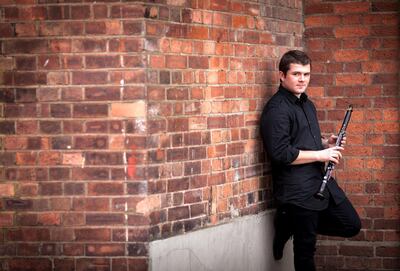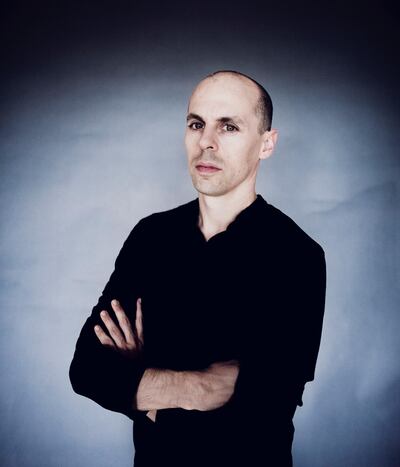The distance between performer and audience is being playfully probed – and subtly ebbed away – by Music in the Studio, the intimate chamber series hosted at Dubai Opera and which is opening ears and broadening horizons.
Now midway through its second season, the monthly programme deliberately invites listeners away from the venue's grand main auditorium, and up the stairs to the cosy Studio space, from which the programme takes its name. Here, either duos or soloists perform in front of a strict capacity of just 285 guests. Each of the seven concerts to date have been at full capacity.
The series continues tomorrow with classical and opera tenor Neil Latchman performing alongside the series' creator, Amira Fouad.
“We have a very limited capacity, and I think that really suits chamber music,” says Fouad, who is a pianist. “It really is as intimate as you can get – you feel every breath and every phrase, it’s very, very special. It’s wonderful for the artists, they come backstage in the interval and say, ‘This is a great audience – I didn’t expect that’.”
Launched as a brave experiment in September, the first four editions of Music in the Studio were a sell-out, prompting a second cycle of six monthly concerts starting in January, of which April’s is the fourth. Among the star attractions so far have been an up-close-and-personal recital from British celebrity violinist Tasmin Little, rising flute star Katherine Bryan, Russian piano maestro Alexander Ghindin and, last month, celebrated French chamber duo Paul Meyer and Eric le Sage.
But while the chance to see these talents in close confines has proved a regional novelty, the series’ more lasting contribution is likely to be off the stage. One of its founding cornerstones was that every visiting artist should also host a masterclass for the Emirates’ homegrown music students – and so far the reception has been phenomenal, Fouad says, with more than 100 young musicians taking part or auditioning for the sessions so far.
Each musician presents a specialist tutorial based on his or her lead instrument. When we talk, Fouad is preparing to audition a long line of singers queuing up for the chance to sit in a masterclass with Latchman, to be hosted two days before the concert.
“I really do believe the masterclasses have a lot to do with audience building, and community outreach,” says Fouad, whose musical experience spans three continents. She was born in Britain to Egyptian parents and educated in Canada and France. “We have seen a huge amount of talent in the UAE – it’s staggering how many young artists we see coming forward. We actually get quite a young dynamic audience, which is really refreshing. It’s just wonderful, I feel very privileged to watch this all unfold.”
According to Fouad, the most moving and memorable moment to date took place away from the stage and behind closed doors, when 30 young guitarists showed up for a group performance workshop, pulling out their instruments to play four intricate parts in unison alongside famed Mexican guitarist Mauricio Diaz Alvarez in February.
“I feel giving something back is my responsibility, artistically curating this series,” she says. “I’ve always felt it’s a huge missed opportunity if you have great artists in town and young people don’t have a chance to meet and learn from them, and from this huge depth of knowledge and experience they bring with them.”
Tomorrow's concert is Fouad's third time on stage during the series – previously backing cellist Guy Johnston and soprano Rhian Lois in the opening season – but this programme will be particularly memorable because it reunites Fouad with long-term creative partner Latchman, a Trinidadian talent she has known for more years than she is prepared to count.
“We met when I was 17, we were both students and I was asked to perform with this tenor for a summer concert, and we’ve given concerts together ever since,” Fouad says. “It’s really amazing.”
After initially bonding at Canada’s Queen’s University, the pair continued to play and record together when both moved to London, and have clocked numerous concerts together over the decades. This will mark the tenor’s first appearance in the UAE.
A regular at venues such as London’s Wigmore Hall and Amsterdam’s Concertgebouw, Latchman is known for his interpretations of works by Tosti, Donizetti and Lecuona, which will feature on the programme in Dubai alongside more familiar fare by Tchaikovsky, Grieg and Chopin. “There’s some German, Italian, French and English,” Fouad says. “Neil is very dramatic onstage.”
The series continues on May 2 with the leading British clarinettist Julian Bliss performing romantic duets by Brahms crossed with some jazz-influenced Gershwin and the Cuban rhythms of Paquito D’Rivera, alongside his long-time piano partner Julien Quentin.
The series will close on June 20 with the rare appearance of the award-winning “four hands” piano duo Bruno Vlahek and Dubravka Vukalovic, presenting a programme of Granados, Ravel, Debussy and Piazzolla on a single piano.
But once more for Fouad, Music in the Studio’s true beauty is away from the banner names and the bright lights. She talks wistfully about the origins of chamber music, which began primarily as pieces composed and printed for amateurs to perform casually at home.
___________________
Read more:
Dubai Opera will be a very special occasion for soprano Dadvar
Prokofiev's Romeo and Juliet: the story behind the ballet coming to Dubai Opera
Hacienda DJs to perform with symphony orchestra at Dubai Opera
___________________
In the days before the phonograph record or the radio, for affluent types, social gatherings would invariably be focused around – and judged on the quality of – the musical programme on offer. But in most cases, the listeners really showed up to mingle, much like any house party or gathering with a soundtrack today.
“In this age of iPad and Bitcoin, with the world moving so tremendously quickly, I have to say it’s so very comforting to know music still brings people together – all kinds of people. Music still bridges gaps and cultures, and you feel that so very much in concerts, and particularly in the UAE,” Fouad says.
“Music in the Studio has become a social hub – you see people greeting each other with hugs, and you also see new faces every month. I’m really happy that live music still has this power.
“It’s the way chamber music began – in people’s homes, always as a social event. And I really think that’s why classical music is coming back. It’s very much a social experience as well as an educational and cultural one.”
Music in the Studio continues tomorrow with Neil Latchman and Amira Fouad, Julian Bliss and Julien Quentin on May 2 and duo Bruno Vlahek and Dubravka Vukalovic on June 20, all at 8pm; tickets Dh150, for more information see dubaiopera.com



